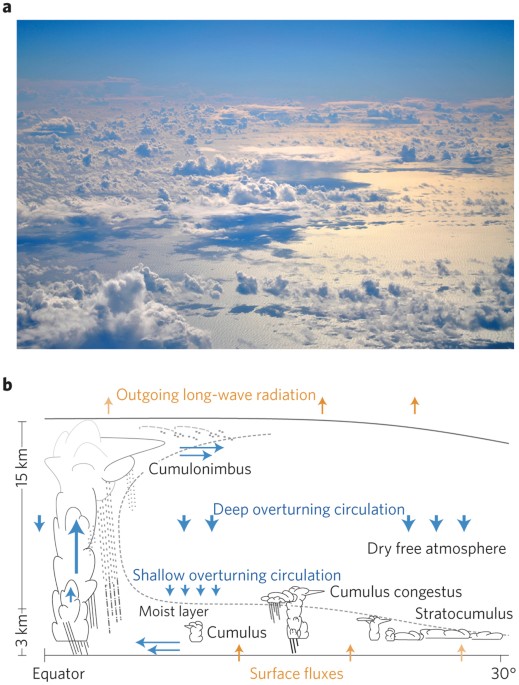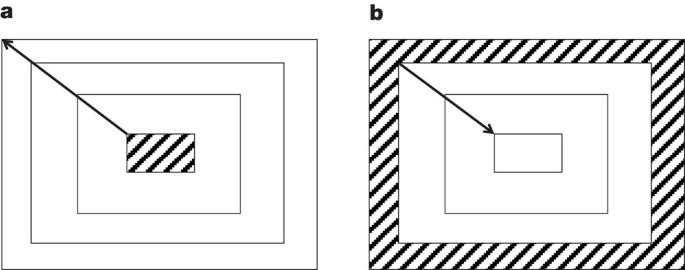
- Select a language for the TTS:
- UK English Female
- UK English Male
- US English Female
- US English Male
- Australian Female
- Australian Male
- Language selected: (auto detect) - EN
Play all audios:
ABSTRACT Fundamental puzzles of climate science remain unsolved because of our limited understanding of how clouds, circulation and climate interact. One example is our inability to provide
robust assessments of future global and regional climate changes. However, ongoing advances in our capacity to observe, simulate and conceptualize the climate system now make it possible to
fill gaps in our knowledge. We argue that progress can be accelerated by focusing research on a handful of important scientific questions that have become tractable as a result of recent
advances. We propose four such questions below; they involve understanding the role of cloud feedbacks and convective organization in climate, and the factors that control the position, the
strength and the variability of the tropical rain belts and the extratropical storm tracks. Access through your institution Buy or subscribe This is a preview of subscription content, access
via your institution ACCESS OPTIONS Access through your institution Subscribe to this journal Receive 12 print issues and online access $259.00 per year only $21.58 per issue Learn more Buy
this article * Purchase on SpringerLink * Instant access to full article PDF Buy now Prices may be subject to local taxes which are calculated during checkout ADDITIONAL ACCESS OPTIONS: *
Log in * Learn about institutional subscriptions * Read our FAQs * Contact customer support SIMILAR CONTENT BEING VIEWED BY OTHERS GREATER CLIMATE SENSITIVITY IMPLIED BY ANVIL CLOUD THINNING
Article 17 April 2024 EQUILIBRIUM CLIMATE SENSITIVITY ABOVE 5 °C PLAUSIBLE DUE TO STATE-DEPENDENT CLOUD FEEDBACK Article 26 October 2020 MODEL SPREAD IN TROPICAL LOW CLOUD FEEDBACK TIED TO
OVERTURNING CIRCULATION RESPONSE TO WARMING Article Open access 19 November 2022 REFERENCES * Emanuel, K. in _Meteorology at the Millennium_ (ed. Pearce, R. P.) 1–14 (Academic, 2002). Google
Scholar * Sherwood, S. C., Bony, S. & Dufresne, J-L. Spread in model climate sensitivity traced to atmospheric convective mixing. _Nature_ 505, 37–42 (2014). Article Google Scholar *
IPCC Summary for Policymakers _Climate Change 2013: The Physical Science Basis_ (eds Stocker, T. F. et al.) 1–29 (Cambridge Univ. Press, 2013). * Shepherd, T. G. Atmospheric circulation as
a source of uncertainty in climate change projections. _Nature Geosci._ 7, 703–708 (2014). Article Google Scholar * Stevens, B. & Bony, S. What are climate models missing? _Science_
340, 1053–1054 (2013). Article Google Scholar * Bony, S. et al. in _Monograph on Climate Science for Serving Society: Research, Modelling and Prediction Priorities_ (eds Hurrell, J. W.
& Asrar, G.) 391–413 (Springer, 2013). Book Google Scholar * Boucher, O. et al. in _Climate Change 2013: The Physical Science Basis_ (eds Stocker, T. et al.) 571–657 (IPCC, Cambridge
Univ. Press, 2013). Google Scholar * Sherwood, S. C. et al. in _Climate Science for Serving Society_ (eds Hurrell, J. W. & Asrar, G.) 73–103 (Springer, 2013). Book Google Scholar *
Held, I. Simplicity amid complexity. _Science_ 343, 1206–1207 (2014). Article Google Scholar * Held, I. M. & Hou, A. Y. Nonlinear axially symmetric circulations in a nearly inviscid
atmosphere. _J. Atmos. Sci._ 37, 515–533 (1980). Article Google Scholar * Emanuel, K. A. The dependence of hurricane intensity on climate. _Nature_ 326, 483–485 (1987). Article Google
Scholar * Hartmann, D. L. & Larson, K. An important constraint on tropical cloud–climate feedback. _Geophys. Res. Lett._ 29, 1951 (2002). Article Google Scholar * Cooke, R., Wielicki,
B. A., Young, D. F. & Mlynczak, M. G. Value of information for climate observing systems. _Environ. Syst. Decis._ 34, 98–109 (2013). Article Google Scholar * Stevens, B. & Bony,
S. Water in the atmosphere. _Phys. Today_ 66, 29 (June 2013). * Rieck, M., Nuijens, L. & Stevens, B. Marine boundary layer cloud feedbacks in a constant relative humidity atmosphere. _J.
Atmos. Sci._ 69, 2538–2550 (2012). Article Google Scholar * Zhang, M. et al. CGILS: Results from the first phase of an international project to understand the physical mechanisms of low
cloud feedbacks in single column models. _J. Adv. Model. Earth Syst._ 5, 826–842 (2013). Article Google Scholar * Zhao, M. An investigation of the connections among convection, clouds, and
climate sensitivity in a global climate model. _J. Clim._ 27, 1845–1862 (2014). Article Google Scholar * Zelinka, M. D., Klein, S. A. & Hartmann, D. L. Computing and partitioning
cloud feedbacks using cloud property histograms. Part I: Cloud radiative kernels. _J. Clim._ 25, 3715–3735 (2012). Article Google Scholar * Butler, A. H., Thompson, D. W. J. & Heikes,
R. The steady-state atmospheric circulation response to climate change-like thermal forcings in a simple general circulation model. _J. Clim._ 23, 3474–3496 (2010). Article Google Scholar
* Kang, S. M., Polvani, L. M., Fyfe, J. C. & Sigmond, M. Impact of polar ozone depletion on subtropical precipitation. _Science_ 332, 951–954 (2011). Article Google Scholar * Brayshaw,
D. J., Hoskins, B. & Blackburn, M. The basic ingredients of the North Atlantic storm track. Part I: Land–sea contrast and orography. _J. Atmos. Sci._ 66, 2539–2558 (2009). Article
Google Scholar * Simpson, I. R., Shaw, T. A. & Seager, R. A Diagnosis of the seasonally and longitudinally varying midlatitude circulation response to global warming. _J. Atmos. Sci._
71, 2489–2515 (2014). Article Google Scholar * Woollings, T. Dynamical influences on European climate: an uncertain future. _Phil. Trans. R. Soc. A_ 368, 3733–3756 (2010). Article Google
Scholar * Grise, K. M. & Polvani, L. M. Southern hemisphere cloud–dynamics biases in CMIP5 models and their implications for climate projections. _J. Clim._ 27, 6074–6092 (2014).
Article Google Scholar * Ceppi, P., Zelinka, M. D. & Hartmann, D. L. The response of the southern hemispheric eddy-driven jet to future changes in shortwave radiation in CMIP5.
_Geophys. Res. Lett._ 41, 3244–3250 (2014). Article Google Scholar * Miyamoto, Y. et al. Deep moist atmospheric convection in a subkilometer global simulation. _Geophys. Res. Lett._ 40,
4922–4926 (2013). Article Google Scholar * Rivière, G., Laîné, A., Lapeyre, G., Salas-Mélia, D. & Kageyama, M. Links between Rossby wave breaking and the North Atlantic
Oscillation–Arctic Oscillation in present-day and last glacial maximum climate simulations. _J. Clim._ 23, 2987–3008 (2010). Article Google Scholar * Kohfeld, K. E. & Harrison, S. C.
How well can we simulate past climates? Evaluating the models using global palaeoenvironmental datasets. _Quat. Sci. Rev._ 19, 321–346 (2000). Article Google Scholar * Braconnot, P. et al.
Evaluation of climate models using palaeoclimatic data. _Nature Clim. Change_ 2, 417–424 (2012). Article Google Scholar * Marsham, J. H. et al. The role of moist convection in the West
African monsoon system: Insights from continental-scale convection-permitting simulations. _Geophys. Res. Lett._ 40, 1843–1849 (2013). Article Google Scholar * Biasutti, M. & Giannini,
A. Robust Sahel drying in response to late 20th century forcings. _Geophys. Res. Lett._ 33, L11706 (2006). Article Google Scholar * Kang, S. M., Held, I. M., Frierson, D. M. W. &
Zhao, M. The response of the ITCZ to extratropical thermal forcing: Idealized slab-ocean experiments with a GCM. _J. Clim._ 21, 3521–3532 (2008). Article Google Scholar * Hwang, Y. T.
& Frierson, D. Link between the double-Intertropical Convergence Zone problem and cloud biases over the Southern Ocean. _Proc. Natl Acad. Sci. USA_ 110, 4935–4940 (2013). Article Google
Scholar * Held, I. M., Delworth, T. L., Lu, J., Findell, K. L. & Knutson, T. R. Simulation of Sahel drought in the 20th and 21st centuries. _Proc. Natl Acad. Sci. USA_ 102, 17891–17896
(2005). Article Google Scholar * Perez-Sanz, A., Li, G., González-Sampériz, P. & Harrison, S. P. Evaluation of modern and mid-Holocene seasonal precipitation of the Mediterranean and
northern Africa in the CMIP5 simulations. _Clim. Past_ 10, 551–568 (2014). Article Google Scholar * Donohoe, A., Marshall, J., Ferreira, D. & McGee, D. The relationship between ITCZ
location and cross-equatorial atmospheric heat transport: From the seasonal cycle to the last glacial maximum. _J. Clim._ 26, 3597–3618 (2013). Article Google Scholar * Houze, R. A. Jr.
Cloud clusters and large-scale vertical motions in the tropics. _J. Meteorol. Soc. Japan_ 60, 396–408 (1982). Article Google Scholar * Bretherton, C. S., Blossey, P. N. &
Khairoutdinov, M. An energy-balance analysis of deep convective self-aggregation above uniform SST. _J. Atmos. Sci._ 62, 4273–4292 (2005). Article Google Scholar * Tobin, I., Bony, S.
& Roca, R. Observational evidence for relationships between the degree of aggregation of deep convection, water vapor, surface fluxes, and radiation. _J. Clim._ 25, 6885–6904 (2012).
Article Google Scholar * Wing, A. A. & Emanuel, K. A. Physical mechanisms controlling self-aggregation of convection in idealized numerical modeling simulations. _J. Adv. Model. Earth
Syst._ 6, 59–74 (2014). Article Google Scholar * Seifert, A. & Heus, T. Large-eddy simulation of organized precipitating trade wind cumulus clouds. _Atmos. Chem. Phys._ 13, 5631–5645
(2013). Article Google Scholar * Muller, C. J. & Held, I. M. Detailed investigation of the self-aggregation of convection in cloud-resolving simulations. _J. Atmos. Sci._ 69, 2551–2565
(2012). Article Google Scholar * Neggers, R. A. J., Neelin, J. D. & Stevens, B. Impact mechanisms of shallow cumulus convection on tropical climate dynamics. _J. Clim._ 20, 2623–2642
(2007). Article Google Scholar * Jakob, C. Accelerating progress in global atmospheric model development through improved parameterization. _Bull. Am. Meteorol. Soc._ 91, 869–875 (2010).
Article Google Scholar * Lorenz, E. N. in _The General Circulation of the Atmosphere_ (ed. Corby, G. A.) 3–23 (Royal Meteorological Society, 1969); http://go.nature.com/Y3b8bO Google
Scholar * Slingo, A. & Slingo, J. The response of a general circulation model to cloud longwave radiative forcing. I: Introduction and initial experiments. _Q. J. R. Meteorol. Soc._
114, 1027–1062 (1988). Article Google Scholar * Bony, S. & Emanuel, K. A. On the role of moist processes in tropical intraseasonal variability: Cloud-radiation and moisture-convection
feedbacks. _J. Atmos. Sci._ 62, 2770–2789 (2005). Article Google Scholar * Chagnon, S., Gray, S. L. & Methven, J. Diabatic processes modifying potential vorticity in a North Atlantic
cyclone. _Q. J. R. Meteorol. Soc._ 139, 1270–1282 (2013). Article Google Scholar * Joos, H. & Wernli, H. Influence of microphysical processes on the potential vorticity development in
a warm conveyor belt: a case study with the limited area model COSMO. _Q. J. R. Meteorol. Soc._ 138, 407–418 (2012). Article Google Scholar * Martin, G. M. et al. Analysis and reduction of
systematic errors through a seamless approach to modeling weather and climate. _J. Clim._ 23, 5933–5957 (2010). Article Google Scholar Download references ACKNOWLEDGEMENTS This paper was
developed as part of the Grand Challenge on Clouds, Circulation and Climate Sensitivity of the World Climate Research Programme. The process of identifying a handful of key scientific
questions culminated in a workshop whose participants are gratefully acknowledged: D. Abbot, P. Bauer, M. Biasutti, H. Douville, J-L. Dufresne, A. Del Genio, K. Emanuel, Q. Fu, J.
Hargreaves, S. Harrison, I. Held, C. Hohenegger, B. Hoskins, S. Kang, H. Kawai, S. A. Klein, N. Loeb, T. Mauritsen, B. Mapes, M. Miller, C. Muller, C. Prentice, C. Risi, M. Satoh, C.
Schumacher, B. Wielicki, M. Yoshimori and P. Zuidema. We thank the German Weather Service, PMIP, EUMETSAT and NASA for data. M. Doutriaux-Boucher (EUMETSAT) provided the satellite products
used in Fig. 2a and b. S.B. and B.S. acknowledge support from the LABEX L-IPSL and the Max Planck Society for the Advancement of Science. M.J.W. was supported by the Joint UK DECC/Defra Met
Office Hadley Centre Climate Programme (GA01101). AUTHOR INFORMATION AUTHORS AND AFFILIATIONS * LMD/IPSL, CNRS, Université Pierre et Marie Curie, UMR 8539, 4 Place Jussieu, mail box 99,
75252, Paris, France Sandrine Bony * Max Planck Institute for Meteorology, Bundesstrasse 53, Hamburg, D-20146, Germany Bjorn Stevens * Department of Atmospheric Sciences, University of
Washington, Seattle, 98195-1640, Washington, USA Dargan M. W. Frierson * School of Mathematical Sciences, Monash University, Clayton, 3800, Victoria, Australia Christian Jakob * LSCE/IPSL,
CEA-CNRS-UVSQ, UMR 8212, Orme des Merisiers, Gif-sur-Yvette, 91191, France Masa Kageyama * University of Colorado, Boulder, CIRES, 216 UCB, Boulder, 80309, Colorado, USA Robert Pincus *
Physical Sciences Division, NOAA/Earth System Research Lab, Boulder, 80305, Colorado, USA Robert Pincus * Department of Meteorology, University of Reading, Reading, RG6 6BB, UK Theodore G.
Shepherd * Climate Change Research Centre and ARC Centre of Excellence for Climate System Science, University of New South Wales, Sydney, 2052, Australia Steven C. Sherwood * KNMI, Postbus
201, De Bilt, 3730 AE, the Netherlands A. Pier Siebesma * Department of Applied Physics and Applied Mathematics, Columbia University, New York, 10027, New York, USA Adam H. Sobel *
Atmosphere and Ocean Research Institute, University of Tokyo, Chiba, 277-8568, Japan Masahiro Watanabe * Hadley Centre, Met Office, Exeter, EX1 3PB, UK Mark J. Webb Authors * Sandrine Bony
View author publications You can also search for this author inPubMed Google Scholar * Bjorn Stevens View author publications You can also search for this author inPubMed Google Scholar *
Dargan M. W. Frierson View author publications You can also search for this author inPubMed Google Scholar * Christian Jakob View author publications You can also search for this author
inPubMed Google Scholar * Masa Kageyama View author publications You can also search for this author inPubMed Google Scholar * Robert Pincus View author publications You can also search for
this author inPubMed Google Scholar * Theodore G. Shepherd View author publications You can also search for this author inPubMed Google Scholar * Steven C. Sherwood View author publications
You can also search for this author inPubMed Google Scholar * A. Pier Siebesma View author publications You can also search for this author inPubMed Google Scholar * Adam H. Sobel View
author publications You can also search for this author inPubMed Google Scholar * Masahiro Watanabe View author publications You can also search for this author inPubMed Google Scholar *
Mark J. Webb View author publications You can also search for this author inPubMed Google Scholar CONTRIBUTIONS S.B. and B.S. led the writing of the paper. All authors contributed to the
development and writing of the manuscript. CORRESPONDING AUTHOR Correspondence to Sandrine Bony. ETHICS DECLARATIONS COMPETING INTERESTS The authors declare no competing financial interests.
RIGHTS AND PERMISSIONS Reprints and permissions ABOUT THIS ARTICLE CITE THIS ARTICLE Bony, S., Stevens, B., Frierson, D. _et al._ Clouds, circulation and climate sensitivity. _Nature
Geosci_ 8, 261–268 (2015). https://doi.org/10.1038/ngeo2398 Download citation * Received: 11 November 2014 * Accepted: 23 February 2015 * Published: 31 March 2015 * Issue Date: April 2015 *
DOI: https://doi.org/10.1038/ngeo2398 SHARE THIS ARTICLE Anyone you share the following link with will be able to read this content: Get shareable link Sorry, a shareable link is not
currently available for this article. Copy to clipboard Provided by the Springer Nature SharedIt content-sharing initiative







